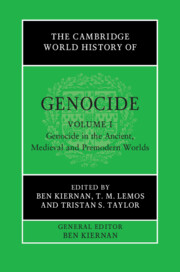Book contents
- The Cambridge World History of Genocide
- The Cambridge World History of Genocide
- The Cambridge World History of Genocide
- Copyright page
- Contents
- Figures
- Maps
- Tables
- Contributors to Volume I
- General Editor’s Acknowledgements
- General Editor’s Introduction to the Series
- Introduction to Volume I
- Part I Themes of Genocide through History
- Part II The Ancient World
- Part III The Medieval World and Early Imperial Expansions
- 15 William the Conqueror’s Harrying of the North, 1069–1070
- 16 Genocidal Massacres of Jews in Medieval Western Europe, 1096–1392
- 17 Crusaders and Mass Killing at Jerusalem in 1099
- 18 The Albigensian Crusade and the Early Inquisitions into Heretical Depravity, 1208–1246
- 19 Mongol Genocides of the Thirteenth Century
- 20 Việt Nam and the Genocide of Champa, 1470–1509
- 21 Genocidal Massacres in Medieval India
- 22 Mass Extermination in Prehistoric Andean South America
- 23 The Spanish Destruction of the Canary Islands
- 24 Genocidal Massacres in the Spanish Conquest of the Americas
- Index
18 - The Albigensian Crusade and the Early Inquisitions into Heretical Depravity, 1208–1246
from Part III - The Medieval World and Early Imperial Expansions
Published online by Cambridge University Press: 23 June 2023
- The Cambridge World History of Genocide
- The Cambridge World History of Genocide
- The Cambridge World History of Genocide
- Copyright page
- Contents
- Figures
- Maps
- Tables
- Contributors to Volume I
- General Editor’s Acknowledgements
- General Editor’s Introduction to the Series
- Introduction to Volume I
- Part I Themes of Genocide through History
- Part II The Ancient World
- Part III The Medieval World and Early Imperial Expansions
- 15 William the Conqueror’s Harrying of the North, 1069–1070
- 16 Genocidal Massacres of Jews in Medieval Western Europe, 1096–1392
- 17 Crusaders and Mass Killing at Jerusalem in 1099
- 18 The Albigensian Crusade and the Early Inquisitions into Heretical Depravity, 1208–1246
- 19 Mongol Genocides of the Thirteenth Century
- 20 Việt Nam and the Genocide of Champa, 1470–1509
- 21 Genocidal Massacres in Medieval India
- 22 Mass Extermination in Prehistoric Andean South America
- 23 The Spanish Destruction of the Canary Islands
- 24 Genocidal Massacres in the Spanish Conquest of the Americas
- Index
Summary
In 1208 Pope Innocent III proclaimed a crusade of “extermination” and “expurgation” against the heretics supposedly infesting the lands of the count of Toulouse. What is now known as the “Albigensian Crusade” lasted twenty-one years and was the first holy war in which Christians were guaranteed salvation by killing other Christians. The massacres during the crusade, especially at Béziers in 1209, were “genocidal moments.” The victims, though, were neither an ethnic, national, or racial group. The victims were arguably a regional or possibly a cultural group, but such groups are not covered by the modern legal definition of genocide. Nevertheless, they were deliberately targeted for destruction. Despite accusations of heresy, the victims were not initially a self-consciously different religious group either. Crucially, they were not “Cathars,” which is what most medieval historians and genocide scholars assume the victims to have been. “Catharism” as a medieval heresy never existed; it was an invention of nineteenth-century scholars trying to understand the Albigensian crusade more “scientifically” and less confessionally. Finally, were the individual testimonies collected by the first inquisitions into heretical depravity, established in Toulouse in the aftermath of the Albigensian crusade, analogous to the memories of individuals who witnessed or survived genocides collected by modern tribunals?
- Type
- Chapter
- Information
- The Cambridge World History of Genocide , pp. 470 - 497Publisher: Cambridge University PressPrint publication year: 2023



